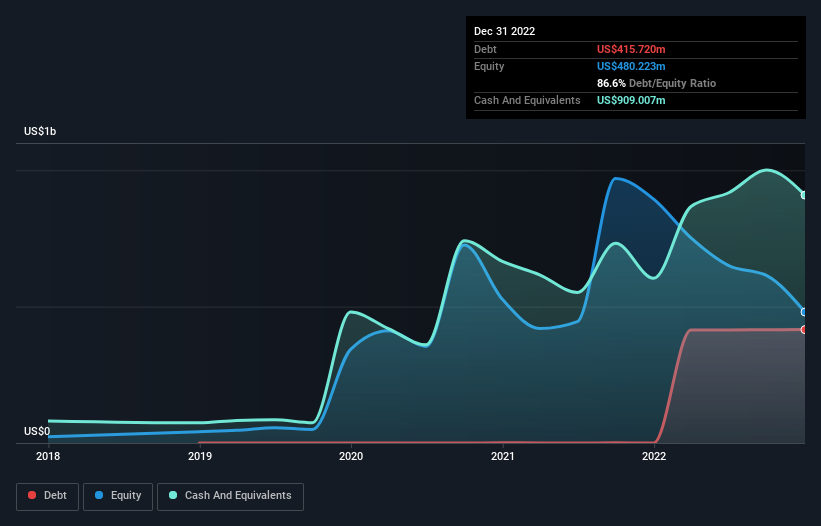- United States
- /
- Aerospace & Defense
- /
- NYSE:SPCE
Is Virgin Galactic Holdings (NYSE:SPCE) A Risky Investment?

Some say volatility, rather than debt, is the best way to think about risk as an investor, but Warren Buffett famously said that 'Volatility is far from synonymous with risk.' So it seems the smart money knows that debt - which is usually involved in bankruptcies - is a very important factor, when you assess how risky a company is. Importantly, Virgin Galactic Holdings, Inc. (NYSE:SPCE) does carry debt. But should shareholders be worried about its use of debt?
When Is Debt Dangerous?
Generally speaking, debt only becomes a real problem when a company can't easily pay it off, either by raising capital or with its own cash flow. Ultimately, if the company can't fulfill its legal obligations to repay debt, shareholders could walk away with nothing. However, a more common (but still painful) scenario is that it has to raise new equity capital at a low price, thus permanently diluting shareholders. Of course, the upside of debt is that it often represents cheap capital, especially when it replaces dilution in a company with the ability to reinvest at high rates of return. The first step when considering a company's debt levels is to consider its cash and debt together.
See our latest analysis for Virgin Galactic Holdings
What Is Virgin Galactic Holdings's Debt?
The image below, which you can click on for greater detail, shows that at December 2022 Virgin Galactic Holdings had debt of US$415.7m, up from none in one year. But it also has US$909.0m in cash to offset that, meaning it has US$493.3m net cash.

How Healthy Is Virgin Galactic Holdings' Balance Sheet?
Zooming in on the latest balance sheet data, we can see that Virgin Galactic Holdings had liabilities of US$184.1m due within 12 months and liabilities of US$475.7m due beyond that. On the other hand, it had cash of US$909.0m and US$4.50m worth of receivables due within a year. So it actually has US$253.8m more liquid assets than total liabilities.
This surplus suggests that Virgin Galactic Holdings is using debt in a way that is appears to be both safe and conservative. Given it has easily adequate short term liquidity, we don't think it will have any issues with its lenders. Simply put, the fact that Virgin Galactic Holdings has more cash than debt is arguably a good indication that it can manage its debt safely. There's no doubt that we learn most about debt from the balance sheet. But ultimately the future profitability of the business will decide if Virgin Galactic Holdings can strengthen its balance sheet over time. So if you're focused on the future you can check out this free report showing analyst profit forecasts.
Over 12 months, Virgin Galactic Holdings made a loss at the EBIT level, and saw its revenue drop to US$2.3m, which is a fall of 30%. To be frank that doesn't bode well.
So How Risky Is Virgin Galactic Holdings?
We have no doubt that loss making companies are, in general, riskier than profitable ones. And we do note that Virgin Galactic Holdings had an earnings before interest and tax (EBIT) loss, over the last year. Indeed, in that time it burnt through US$397m of cash and made a loss of US$500m. However, it has net cash of US$493.3m, so it has a bit of time before it will need more capital. Overall, its balance sheet doesn't seem overly risky, at the moment, but we're always cautious until we see the positive free cash flow. The balance sheet is clearly the area to focus on when you are analysing debt. But ultimately, every company can contain risks that exist outside of the balance sheet. Case in point: We've spotted 4 warning signs for Virgin Galactic Holdings you should be aware of.
If you're interested in investing in businesses that can grow profits without the burden of debt, then check out this free list of growing businesses that have net cash on the balance sheet.
If you're looking to trade Virgin Galactic Holdings, open an account with the lowest-cost platform trusted by professionals, Interactive Brokers.
With clients in over 200 countries and territories, and access to 160 markets, IBKR lets you trade stocks, options, futures, forex, bonds and funds from a single integrated account.
Enjoy no hidden fees, no account minimums, and FX conversion rates as low as 0.03%, far better than what most brokers offer.
Sponsored ContentNew: Manage All Your Stock Portfolios in One Place
We've created the ultimate portfolio companion for stock investors, and it's free.
• Connect an unlimited number of Portfolios and see your total in one currency
• Be alerted to new Warning Signs or Risks via email or mobile
• Track the Fair Value of your stocks
Have feedback on this article? Concerned about the content? Get in touch with us directly. Alternatively, email editorial-team (at) simplywallst.com.
This article by Simply Wall St is general in nature. We provide commentary based on historical data and analyst forecasts only using an unbiased methodology and our articles are not intended to be financial advice. It does not constitute a recommendation to buy or sell any stock, and does not take account of your objectives, or your financial situation. We aim to bring you long-term focused analysis driven by fundamental data. Note that our analysis may not factor in the latest price-sensitive company announcements or qualitative material. Simply Wall St has no position in any stocks mentioned.
About NYSE:SPCE
Virgin Galactic Holdings
An aerospace and space travel company, focuses on the development, manufacture, and operation of spaceships and related technologies.
Excellent balance sheet and fair value.
Market Insights
Community Narratives



